Who is Ares?
Ares is the Greek god of war that was known for his destructive behavior. While it is known that Athena was also a goddess of war (and sibling to Ares) the two couldn’t be any more different. Athena was known for her knowledge and strategies that were associated with war while Ares was known to be the personification of all the violence and rage that make up war. Coincidentally, Athena was one of Zeus’ favorite children while Ares was Zeus’ least favorite child and hated by many other gods and goddesses.
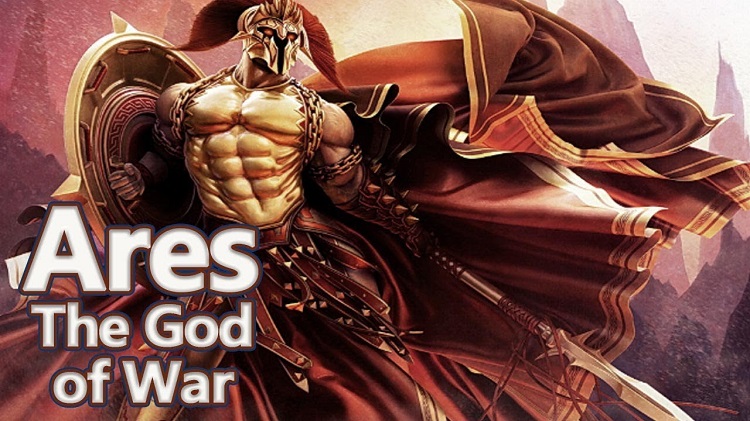
While Ares’ Roman counterpart (Mars) gained more respect among the people, the Greeks and their deities had little use for a god as reckless and violent as Ares. The one exception seems to be the goddess Aphrodite. While she isn’t the only woman Ares had relations with, she is the most notable and bore him many influential children. The number varies depending on the source, but it has been confirmed that Deimos, Phobos, and Harmonia were all born to Ares. Later sources also include Adrestia, and the four Erotes – Eros, Anteros, Pothos, and Himeros as being children of Aphrodite and Ares.
Why Was Ares so Hated By the Other Gods?
Although it would seem that a god who embodied war would be greatly respected and admired by the early Greeks, they seemed to have little use for Ares. This is likely because of his reckless and irresponsible behavior that often led him to be rash and act on his impulses instead of patiently contriving a thorough battle plan.
The few stories that do tell us of Ares’ deeds and accomplishments suggest that the god was not the bravest of his siblings despite his lust for war. One story tells of Ares returning, wounded, from the Trojan war and complaining to Zeus about his injuries. Zeus responds by calling him a two faced liar and informing him that his is the most hated among all of Zeus’ children. In fact, Zeus tells Ares that if he weren’t his son, he would have been cast into the depths of Tartarus long ago.
It was also known that Ares wasn’t one to respect the boundaries of another’s happiness – even when it came to marriage. He started an affair with Aphrodite – the wife of his own brother, Hephaestus. This is one of the most well-known tales that speaks of Ares, partly because of the great shame that was brought upon the god for choosing to ignore the sanctity of his brother’s marriage.
Why Wasn’t Ares Worshiped By The People?
While it makes sense that Ares wouldn’t be popular among the powerful Greek deities, there are some who wonder why he didn’t become more popular among the citizens of early Greece. Perhaps the most important factor that came for the people’s fear and hatred of Ares can be found in the god’s tendencies to ignore the well being of his followers.
The early Greeks knew that they would only be able to rely on Ares when it came to conflict. The problem with this was that Ares was known to get caught up in the destruction of battle itself and had no loyalties when it came to fighting. Those who prayed to Ares may enjoy his support early on in the beginnings of the struggle, but they would often be dismayed to find the god fighting for the other side to prolong the battle and increase the death and destruction caused by the war.
The one exception among the Greeks and their perspective of Ares was the Spartans. The warriors of Sparta were devoted to supporting Ares’ cause and even made human sacrifices to the god with their prisoners of war. Later on, the Spartans would also be known to sacrifice dogs to the god – a strange practice during that time.
Did Ares Have Any Redeeming Qualities?
Although it was generally agreed that Ares was one of the most hated and least respected gods in Greek mythology, it is notable to mention that Ares has some of the best relationships with women out of all the gods. He never used trickery or force to form a union with a woman – although he never married either. Still, Ares was known for generally showing respect towards his partners. It was, perhaps, his only ‘soft’ side or compassionate attribute.
Ares Defends His Daughter, Alcippe
This demeanor extended past his love life. There is a story that tells of one of Ares’ daughters, whose name was Alcippe. One day, a son of Poseidon named Halirrhothius came across Alcippe and deeply desired her. It appears, however, that Alcippe did not reciprocate the same feelings. Instead of moving on, Halirrhothius decided to rape Alcippe (or at least attempted to do so according to legend). When Ares saw what had happened, he was enraged. He immediately came to his daughter’s defense, stopping the attack and brutally killing Halirrhothius.

When Poseidon learned of what had happened to Halirrhothius , he was furious and demanded a trial. It was common for many of the gods to take advantage of women or force them into sexual relations, which likely made Ares’ aggression and defense of his daughter unusual. Poseidon called for a trial for the killing of his son – which may be the earliest recorded murder trial in history. The trial was held on a hill in Mount Olympus that is now called Aeropagus (Ares’ Hill). All of the other gods and goddesses came to pass judgment on Ares for his deeds and eventually found him ‘not guilty’ of all charges. He was, however, required to host a sporting event in Halirrhothius ’ honor – an event that would later be associated with Ares as well.
Origins
Legend tells that Ares was one of few children that was born to Zeus by his union with Hera (a few of the others being Eris [goddess of chaos and strife] and Enyo [goddess of war and destruction]). Although Ares is thought to be the only son that was born to Zeus from his marriage with Hera, Zeus was never fond of Ares. In fact, Ares may have been Zeus’ least favorite god, and there was a time when Zeus alluded that he would banish Ares to Tartarus if he wasn’t his own son. This lack of support meant that the other gods and goddesses didn’t have to go out of their way to show kindness to Ares – and many didn’t. Instead, they often left him to defend himself and many of the legends that he appears in describe some sort of humiliation that he was subjected to.
Ares and the Aloadae
When Ares was very young, he was still growing in power as a god and had already developed a taste for war. He enjoyed stirring up battles and causing mischief and violence. It was this thirst for aggression that caused him to displease the Aloadae.
The Aloadae were two giant brothers named Otus and Ephialtes. These two brothers were angered by Ares’ mischief because many of the battles he caused ruined their crops. They conspired to capture him and kept him locked away in a bronze jar for one lunar year (thirteen months). Many legends suggest that Ares’ brief reign would have ended with this story had the stepmother of the two giants not told Hermes what had happened to Ares.
Knowing of Ares’ fate, however, was not enough to motivate the other gods and goddesses to come to his aide. Their quick action was likely also a result of the threats that were being made by Otus and Ephialtes. They were threatening to storm Mount Olympus if they weren’t given the hand of Artemis (for Otus) and Hera (for Ephialtes) in marriage. Knowing that the two brothers would follow through on their plan to storm Mount Olympus if given enough time, a plan was concocted to kill the two giants and free Ares.
Ares Is Sent Away From Mount Olympus
After being imprisoned by the Aloadae and almost perishing from his lack of care and nutrition, Hera decided that Ares (still an infant) should be raised elsewhere. She sent him to live with a lesser known deity named Priapus, who lived on Earth. This is interesting considering that Hera cursed Priapus in the womb which is why he was banished to Earth in the first place. Regardless, Priapus agrees to take care of the young Ares.
Priapus’ teaching Ares would go on to shape the young god’s character and skillset. It was Priapus who taught him much of what he knew. Priapus was also considered to be a warlike god, though he was never given the same level of attention as Ares and Athena. Interestingly enough, Priapus refused to teach Ares anything about warfare until he had first been schooled in the ways of dancing. It was only when Ares had mastered dancing that he was able to learn more about warfare and fighting. Eventually when Ares grew older, he engaged in a number of battles that enabled him to prove himself in a way that earned him a place on Mount Olympus.
Ares Later in Life
Ares Has an Affair with Aphrodite
Ares wasn’t the only undesirable god among Zeus and Hera’s offspring. His brother Hephaestus was also rejected because of his terrible ugliness. As revenge, Hephaestus made a golden throne for Hera that wouldn’t allow her to get up until she met all of his demands. Among these demands were that Hephaestus be allowed back onto Mount Olympus and that he be given Aphrodite’s hand in marriage. This last demand caused extreme displeasure to Ares and Aphrodite, who had already fallen in love.
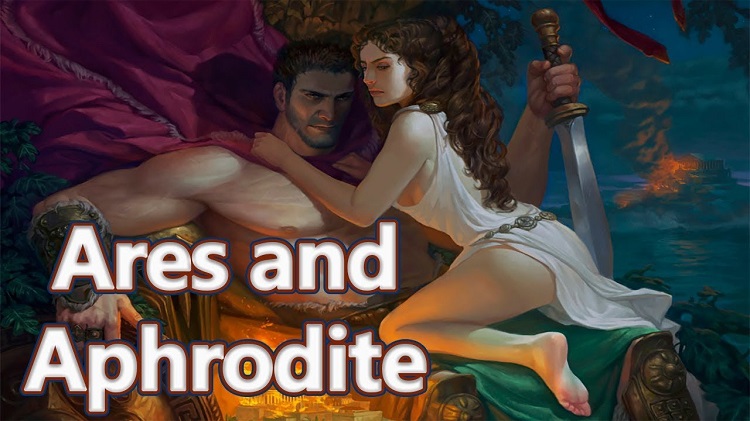
Because they did not wish to give up the connection that had already been kindled between them, Ares and Aphrodite decided to continue their relationship in secret. This was fine for a time, but eventually Helios saw the two in an intimate embrace and told Hephaestus of the affair. Hephaestus was immediately angered and wanted revenge. Instead of confronting Ares directly, he made a net of the finest metals that he had. The end-product was a trap that was practically invisible and could be sprung by Hephaestus at any time he chose.
Hephaestus waited until Ares and Aphrodite had engage in passionate lovemaking before he sprang his trap. The net shot up and trapped the two lovers in an intimate embrace that they couldn’t free themselves from. To make matters worse, Hephaestus invited all the gods and goddesses to his home to see the two lovers in their shameful state. The goddesses declined out of respect, but many of the gods went to marvel at Aphrodite’s beauty and cast shame upon Ares. The two were held in their revealing embrace for days before Hephaestus decided to let them go.
Ares and Aphrodite never married, but there was a level of commitment that was shared between the two. Aphrodite went on to give birth to several children for Ares. Among these children were Phobos (god of fear and phobias), Deimos (god of terror), Harmonia (goddess of harmony), and Adrestia (goddess of revolt). Although it is not surprising that Ares was father to so many war gods and goddesses, it is also noted that he bore four other children with Aphrodite that were considerably more gentle in nature. These were the Erotes (the winged gods of love) and their names were Eros, Anteros, Himeros, and Pothos.
Ares Tries to Avenge Cycnus
With the violent nature and tendencies that are often associated with Ares, it shouldn’t come as a surprise that the majority of his offspring had the same attributes. Though Ares’ family was often rough around the edges, they did have respect for their father and worked to show their admiration in strange and often grotesque ways.
Perhaps the best example of these acts was the temple that was being built in Ares’ honor by Cycnus. It is known that Cycnus was an evil man who was extremely cruel. He had a habit of killing both men and animals in brutal fashion and then stealing their bones. He planned to use their bones and skulls to construct a gory temple in his father’s honor. Eventually, the other gods and goddesses grew tired of Cycnus killing their favorite followers and sacrifices meant for them. They decided to intervene. Hercules was instructed to kill Cycnus to bring an end to his reign of terror.
Hercules did as instructed, causing Ares (who was also present) to be enraged. Furious, Ares lunged at the young Hercules and attempted to strike him down with his sword. Athena blocked the strike and instructed Ares to stand down because it was the will of the other gods that Hercules should live. Still enraged and acting on impulse from the loss of his son, Ares ignored the warning and tried to strike at Hercules again. Before he could do so, however, Hercules wounded Ares in the thigh, causing him to fall to the ground in pain. When this happened, Phobos and Deimos descended in Ares’ war chariot and took him back to the safety of Mount Olympus.
Ares in the Trojan War
Unlike the other gods, Ares chose to go against Zeus in the Trojan War and sided with his lover, Aphrodite. He fought with terrifying rage to help the Trojans in their battle against the Achaeans. At one point, his leadership of the Trojan army almost defeated the Achaeans. Unfortunately, there were too many gods who sided with Zeus and helped the Achaeans for the Trojans to succeed. Still, Ares did his best to fight for the honor of Aphrodite. When she was wounded on the battlefield, Ares loaned her his war chariot so that she could escape to safety and have her wounds treated.
Ares also squared off against Athena in the Trojan war, only to be humiliated. He hurled a spear at her chest with great might, but because she wore the Helm of Death she was able to deflect the spear and return a powerful blow herself by hurling a boulder at Ares. The boulder hit Ares with tremendous force and caused him to cry out so loudly that he was heard even over all the chaos on the battlefield. Athena then spent a significant amount of time bragging about her superior talents in war and the battlefield, shaming Ares. Aphrodite tried to come to Ares’ aide, but she was also struck down by Athena.
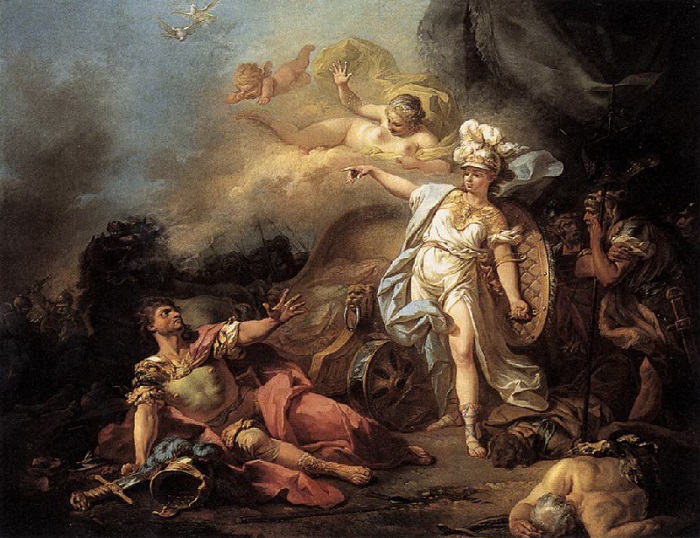
Eventually, the two retreated to Mount Olympus to have their wounds tended to. When Ares went to Zeus to tell him of what had happened on the battlefield, Zeus told Ares that he was “the most hated of all gods who hold Olympus.” Still, Zeus ensured that Ares was properly cared for by instructing Paieon to tend to his son’s wounds.
Children of Ares
Although most of Ares’ children were born to him by Aphrodite, he did have a few demi-god children as well. As with Aphrodite, he maintained some sort of commitment with the mothers of his children, at least for a time, and seemed to genuinely care for the well being of his offspring. This is clearly demonstrated by his quick defense of Alcippe and Cycnus. Ares had many children and did his best to care for all of them.
Phobos and Deimos
Phobos and Deimos (the gods of fear and terror) were born to Ares by Aphrodite and were known to frequently accompany their father into battle. They were often associated with the fear and panic that was often associated with war. However, because Aphrodite was their mother, they were also the gods of fear of significant loss.
Harmonia
Another child of Ares and Aphrodite was Harmonia. She was known to be the goddess of harmony and concord, taking many of her mother’s attributes over her father’s.
Adrestia
Adrestia was a goddess who continued her father’s warlike legacy. Also born from the union of Ares and Aphrodite, she was an immortal who became the goddess of revolt. She was often associated with any sort of revenge and retribution because of her attributes.
The Erotes
The last of Ares’ children from his union with Aphrodite was the Erotes. These children were known to have been gods of love and sexual intimacy. Their names were Eros, Anteros, Himeros, and Pothos.
The Amazons
The Amazons were a fierce group of female warriors and many of them were born through a union between Ares and a nymph named Harmonia (not his daughter). Two famous Amazons named Penthesilea and Hippolyta were both children of Ares. Unfortunately, both women were slayed by Hercules during his quests.
Alcippe
Not much is known of Alcippe other than her unfortunate assault at the hands of Halirrhothius. It is known, however, that Alcippe was very dear to Ares and he swiftly came to her aide during her time of need. Ares stopped Halirrhothius’ attack and brutally killed him for daring to attempt to force his daughter into an unwanted union.
King Diomedes
King Diomedes is most famous for his strange handling of four horses that came to be known as the Mares of Diomedes (also the Mares of Thrace). Diomedes fed these horses human flesh, which caused them to become mad and gave them strange capabilities like breathing fire. Hercules was sent to steal the mares and is known to have lost a dear friend to the cannibalistic beasts because he did not know that they feasted on human flesh. As revenge, Hercules fed Diomedes to the horses to calm them enough to control them and take them to Mount Olympus.
Places Named for Ares
Although Ares was not favored like many of the other gods, there were still places named in his honor.
Areopagus
The Areopagus (Hill of Ares, aka. The Areios) is located on the Acropolis of Athens. This place is named for Ares because it is supposedly where his trial was held when he killed Halirrhothius for assulting his daughter, Alcippe. Although Ares was found to be justified for the killing, the hill was decided as the place where all murder trials would be held. If a person was found to be guilty, they were thrown from the top of the hill to their death.
The Isle of Ares
The Isle of Ares was known to be where the Golden Fleece was kept and proved to be a difficult challenge for Jason and the Argonauts. Ares kept the island guarded by vicious birds that could release dagger-like feathers as weapons against unwanted visitors.
The Garden of Ares
The Garden of Ares is an especially sacred place because it is supposedly where the Golden Fleece was kept until Jason and the Argonauts took it for their quest.
The Planet Ares
Although we know it as Mars today, the Greeks named ‘the red planet’ Ares, the famed war god. It is thought that this planet was named for him because of the red color which likely reminded them of blood and gore.


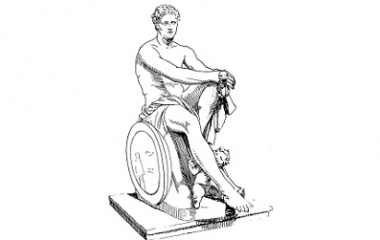
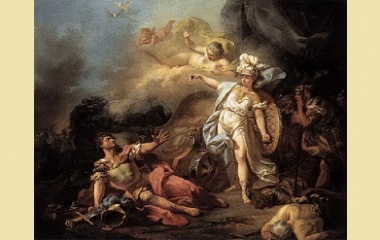
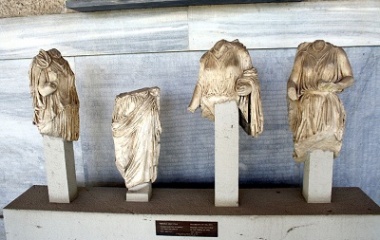






this is good
What year was this published
2018
no it was published in year 8162